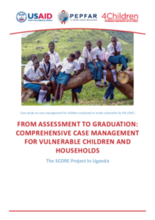Objectives of the case study
The overall objective of the case study is to highlight and help promote good practice related to case management within orphans and vulnerable children (OVC) programming. The case study illustrates the core components of a case management system (see Figure 1), the positive results of a case management system, and some of the challenges in developing, implementing, and solidifying a case management system within an OVC program. The information presented should be understood as just one example of a case management system in practice. Any case management system should be adapted to best reflect the context where it is utilized, the target population it serves, and the programmatic needs of the implementer. The case study is one in a series of case studies highlighting different aspects of a case management system utilized by OVC programs and national child protection systems. The purpose of the case studies is to provide useful information that can inform the work of policy makers and practitioners who aim to effectively support vulnerable children and families.
The information used to inform this case study was collected during a desk review of relevant project documents and through key informant interviews (KII) and focus group discussions (FGD) conducted during a field visit to Uganda in December 2015. In total, 26 documents were included in the desk review and discussions were held with 48 people representing program management staff working with the Sustainable Comprehensive Responses for Vulnerable Children and their Families (SCORE) project, national- and district-level government, civil society organizations (CSOs), community-based facilitators, and trainers, volunteers, and caregivers. This process was not intended as an assessment, but rather as an opportunity to see a case management system in action, speak with those responsible for specific components of the case management system, and hear the voices of those who are served by the case management system. The following case study describes the case management system developed by SCORE.

